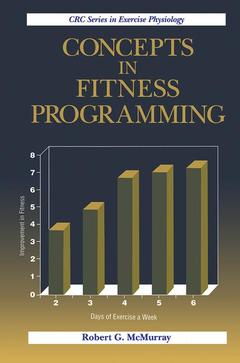Concepts in Fitness Programming Exercise Physiology Series
Auteur : McMurray Robert G.

SECTION I: THE PHYSIOLOGY, Chapter 1 Basic Physiological Concepts, SECTION II: EXERCISE & FITNESS, Chapter 2 Health Risks and Exercise, Chapter 3 Methods of Exercise Testing, Chapter 4 Measurements of Body Composition, Chapter 5 Flexibility, Warm-Up, and Cool-Down Exercises, Chapter 6 Principles of Aerobic Fitness Training, Chapter 7 Strength-Training Techniques, Chapter 8 Low Back Pain and the Effects of an Exercise Program, Chapter 9 Contraindicated Exercise, Chapter 10 Fitness Equipment, Chapter 11 Exercise Leadership and Motivation, Chapter 12 Exercise in Special Populations, Chapter 13 Medications and Exercise, Chapter 14 Care and Prevention of Exercise-Related Injuries, Chapter 15 Civil Liability in Fitness Programming, SECTION IV: LIFESTYLE CONSIDERATIONS, Chapter 16 Cardiovascular Disease: Etiology and Risk Reduction, Chapter 17 Nutrition for Optimal Health and Performance, Chapter 18 Principles of Weight Management, Chapter 19 Stress Management, APPENDICES, Appendix A: Fitness Testing and General Exercise Guidelines, Appendix B: Body Composition, Appendix C: Exercise Circuit, Index
Dr. Robert McMurray is currently Professor of Physical Education, Exercise & Sports Science, Professor of Nutrition, Professor of Physical Therapy, and Director of the Applied Physiology Laboratory at the University of North Carolina at Chapel Hill. Dr. McMurray has been with the university for 20 years. He teaches a number of undergraduate and graduate human physiology, exercise physiology, and sports nutrition courses. Before coming to UNC, he worked as a swimming, soccer and lacrosse coach at Union College in Schenectady, NY, and at State University of New York at Oneonta, NY. He completed his undergraduate education at the State University of New York at Cortland, received his master’s degree at Ball State University in Muncie, IN, and his doctorate at Indiana University in Bloomington. In addition, he has completed postdoctoral experiences at the Institute of Environmental Stress in Santa Barbara, CA, and St. Bartholomew’s Hospital in London. He has been widely published in the scientific literature, has served as a reviewer for a wide variety of exercise and medical journals, and is presently serving on the Editorial Board of Medicine and Science in Sports and Exercise. He is past president of the Southeast Chapter of the American College of Sports Medicine and is a Fellow in the American College of Sports Medicine.
Date de parution : 06-2019
15.6x23.4 cm
Thèmes de Concepts in Fitness Programming :
Mots-clés :
Exercise Induced Asthma; Unsupervised Exercise Program; exercise physiology; Glycemic Index; fitness programs; Light Weights; exercise testing; Specific Gravity Method; cardiovascular physiology; Abdominal Muscles; Recumbent Cycling; Target Heart Rate Range; Chronic Low Back Pain; ACSM; Fitness Instructor; Physical Fitness Program; Exercise Intensity; Submaximal Exercise Testing; Aerobic Power; Aerobic Fitness; Calorie Burn; Aerobic Training; Exercise Prescription; Low Back Injuries; Hr Max; Energy Balance; Low Back Pain; Maximal Exercise Heart Rate; Noninsulin Dependent Diabetes Mellitus



